How a job in maintenance brought Zach Ferone up from rock bottom
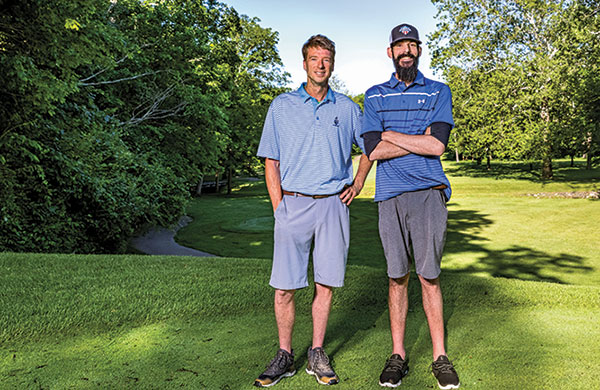
(Left) Brian Burke, superintendent at Sycamore Creek CC, Springboro, Ohio, alongside Zach Ferone, second assistant superintendent. (Photo: Matthew Allen)
Everyone loves a redemption story. They’re reminders that good things can come from tough circumstances and that happy endings really can happen. Such is the story of Zach Ferone.
The second assistant superintendent at Sycamore Creek CC, Springboro, Ohio, Ferone spent three-and-a-half seasons pitching in the Arizona Diamondbacks farm system and independent minor leagues before hanging up the cleats and starting his career in the golf course maintenance industry. In addition to working at SCCC, he is entering his rookie season as a professional angler with the National Professional Fishing League, a professional bass fishing circuit debuting this year.
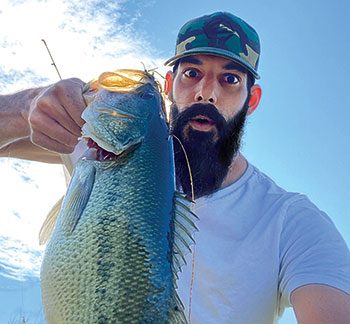
A moment of clarity while fishing on the Ohio River kick-started Zach Ferone’s recovery. (Photo: Zach Ferone)
That’s certainly a unique résumé by anyone’s standards, but those are just the bookends of his adult life. It’s what happened in between that got him where he is today.
Major League dreams
Ferone played collegiate baseball at Muskingum University in New Concord, Ohio, and was signed as an undrafted free agent after a tryout with the Arizona Diamondbacks. A tall, lanky right-hander, Ferone says back then he was simply a thrower.
“I played outfield and pitcher in college, but it wasn’t until I signed that I learned how to pitch,” Ferone recalls. “My fastball was in the low 90s. My change-up and slider were my two best pitches.”
In his first season in the Diamondbacks organization, he ran into a dugout railing while chasing a foul ball — one of those in-betweeners that all
ballplayers hate. Knowing the dugout railing was close and trying to avoid his catcher and first baseman, he slid hoping to make the play and prevent a collision. He ended up jamming his knee into the railing post. The impact resulted in a lumbar disc injury that put him in a back brace and on the disabled list.
His first bullpen session after getting off the DL left him in excruciating pain. Not wanting his manager or coaches to know he was still injured, he went to a member of the medical staff after everyone else had left the clubhouse and asked for something to help with the pain.
Ferone cites an old baseball adage, “You can’t make the club when you’re sitting in the tub.”
It’s hard to keep a kid that age on the bench when his head is full of major league dreams. This mentality led him to what is now almost a cliché in professional sports: Young athlete gets injured, young athlete discovers painkillers allow him to continue to perform at a high level despite chronic pain, young athlete gets released with a pill addiction for a pension.
That is exactly how it went for Ferone. At first, he says he told himself, “Screw it — nobody cares if I do this to get by for now, and playing is my only way out of here.”
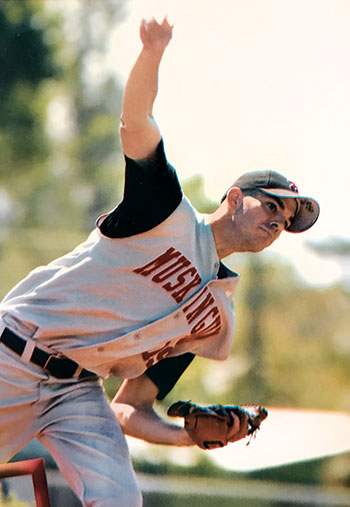
Ferone in his college days at Muskingum University, when he was still a “thrower” and not yet a pitcher. (Photo courtesy of Zach Ferone)
Ironically, as his drug use increased from a once-a-day thing to get through his injury to a multiple-times-a-day habit, he was also pitching well enough to get promoted to high-A ball.
That promotion is what ultimately led to his undoing. Ferone was out of pain meds and sitting in a casino two hours before his first start, trying to win enough money to score more pills. For those unfamiliar with how things work in professional baseball, the only place a starting pitcher should be two hours before a scheduled start is at the ballpark. The fact he wasn’t did not go over well with his manager or general manager.
Released and in denial
When Ferone finally showed up at the park, his manager came to his locker and found the pills and knew Ferone had a problem. Because Ferone’s dad had flown in for the game, he was able to talk his manager into allowing him to make his start. After the game he was called into the GM’s office and given three options: go on the DL and to rehab; a fine and a 60-day suspension; or accept an outright release.
Because Ferone was in complete denial that he had a problem, even when things were clearly starting to fall apart around him, he accepted his outright release. Ferone regards this as the most dangerous point of his addiction.
“It’s the point where the addict can either walk away from the cliff or they can jump off it,” he says. “I jumped.”
After being released by the Diamondbacks, he spent two-and-a-half seasons in the independent leagues before returning home with, in his words, “seven bucks and a pain killer addiction.” Between a divorce, losing his job and becoming estranged from many in his family — all direct results of his addiction — Ferone ended up homeless for nine months, sleeping in his car along the Ohio River. He had nothing more to his name than the car, a change of clothes and a fishing rod.
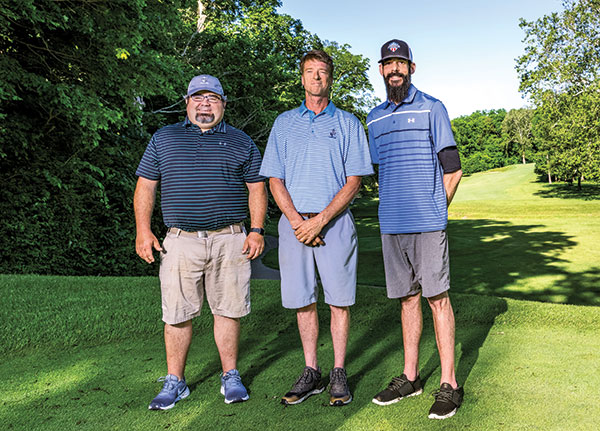
Burke and Ferone with Assistant Superintendent Bob Herr (left.) “There are hundreds of guys in the industry like Bob, who are so dedicated and deserve to be in a magazine more than me,” Ferone says. (Photo: Matthew Allen)
The turning point in Ferone’s life, the moment of clarity that recovering addicts frequently talk about, came one day while he was fishing. The fishing rod became the foothold, an anchoring point of sorts for him, a way to find some peace in the midst of the chaos of addiction and homelessness. Anglers understand the serenity of being on the water and the perspective it can provide.
While fishing he thought to himself simply, “You’re better than this.” That was the moment Zach Ferone’s recovery started.
It takes guts to stare down the beast of addiction and to face the collateral damage resulting from it. Fortunately, Ferone has guts for days. But to be fair, people who overcome the formidable odds of opiate addiction and homelessness rarely do so completely by themselves.
For Ferone, there was his cousin, a Catholic priest, who took him in shortly after his epiphany on the river and provided him a safe place to detox and get back on his feet physically, emotionally and spiritually. Then there was the young public defender who looked him dead in the eye during their first meeting and told him that his pride was going to be his undoing — words that Ferone knew were accurate and says were life-changing.
Stepping stones
After getting clean, his father, a tough love kind of guy who loved his son enough to not enable his addiction, allowed him to move back into his house with the understanding that he needed to find a job. Not long after that, Ferone saw a help wanted ad for a local golf course and applied. While that moment on the river may have saved his life, Ferone credits getting hired by Rick Grote at Oasis GC in Cincinnati as the stepping stone to the next chapter of his life. Despite knowing, as Ferone puts it, “that I was not the most ideal candidate,” Grote gave him a shot anyway.
It was the routine and stability of the job that appealed most to Ferone.
“I went from homeless and addicted to the routine and stability that there is in golf course maintenance — you get to work early, you look at the job board and you get to work,” he says. “I’m a manual labor kind of guy. I like to get my hands dirty. And there’s also those moments where you lay down some stripes on a green and you say to yourself, ‘that looks sweet, let me take a photo of that.’”
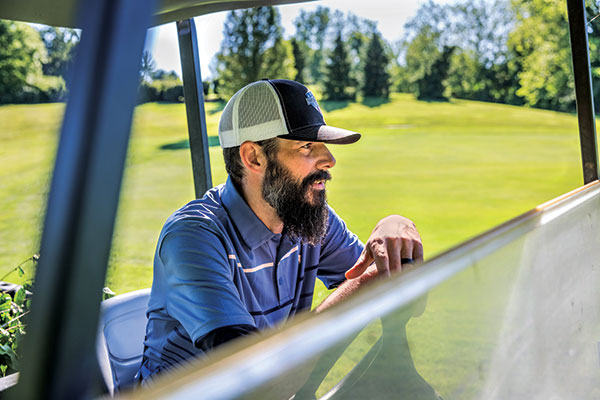
For Zach Ferone, greenskeeping is a source of pride: “There’s those moments where you lay down some stripes on a green and you say to yourself, ‘that looks sweet, let me take a photo.’” (Photo: Matthew Allen)
Three years after being granted a fresh start by Grote, Ferone met his wife, Lesley, a woman who he unashamedly calls his rock both in life and in his continued recovery. That relationship led to him moving to be closer to her. As luck or fate would have it, Brian Burke, superintendent at Sycamore Creek in Springboro, Ohio, had an opening on his staff.
In his five years with Burke, Ferone has advanced from a member of the crew to his current second assistant position. He says Burke not only took a chance on him but also “has brought more stability to my life than I can even put into words.”
He credits the consistency of Burke as playing a major role in his continued recovery and says, “You know what to expect from him and you know what he expects from you every day.”
A major component of those expectations is mutual respect. Ferone repeatedly mentions his respect for Burke as a person and a boss as well as the respect Burke shows his team by listening to their input and valuing their experience and effort.
Now approaching eight years of sobriety, Ferone sits on the cusp of the next chapter of his life as a professional bass fisherman. He already has several sponsors including Regulator Bait Co. and Elite Anglr outdoor apparel company.
While his goal is to eventually fish professionally full time on one of the major circuits, he credits his career in turf as giving him the foundation on which to rebuild his life.
He’s content to be where he is today, working on the golf course, no longer hooked.









